When you’re 36 weeks pregnant, your baby is ready to nurse, and your breasts may be ready too. Some moms experience that their breasts leak colostrum. You can read about the magic components of breast milk here.
If you’re lucky, you will find it slightly easier to breathe now if the baby is engaged and positioned lower in your belly.
This article covers baby development, mom’s body, and the prepping you might want to do this week.
Week 35 | Week 37
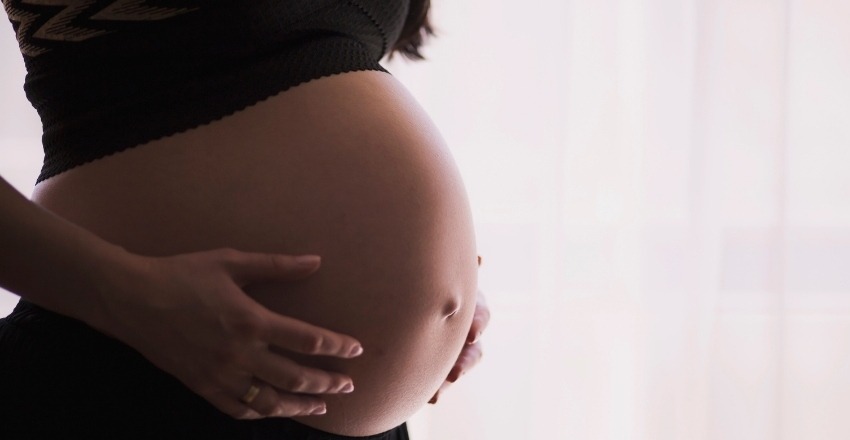
What to Expect When 36 Weeks Pregnant?
In this article:
- How Many Months is 36 Weeks Pregnant?
- Your Baby’s Development
- Mom’s Body When 36 Weeks Pregnant
- Things to Do and Buy This Week
- Week 36 Pregnancy Video
- Diary of a Daughter
How Many Months is 36 Weeks Pregnant?
You entered the last month of the third trimester, which is also the last month of pregnancy. You are now in month 9 of pregnancy and are getting so close to meeting your baby.
If you are having trouble understanding how are pregnancy weeks and months counted, we wrote a post that covers the logic behind counting weeks and months in pregnancy. You can also read about the difference between the fetal and gestational age and learn how the due date is calculated.
Your Baby’s Development
How Big is my Baby at 36 Weeks?
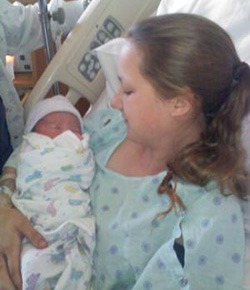 As the pregnancy is coming to an end, more babies are being born each week, although they are still a bit premature. The mom in the picture (Sarah from Charlevoix, MI, USA) was up for a surprise when she went for her pregnancy check-up:
As the pregnancy is coming to an end, more babies are being born each week, although they are still a bit premature. The mom in the picture (Sarah from Charlevoix, MI, USA) was up for a surprise when she went for her pregnancy check-up:
The last pregnancy check-up I went to at 36 weeks pregnant, I was having lower back pain (contractions) and apparently dilated enough to be considered in labor. 4 weeks before I was due.
I was nowhere near ready. In fact, I had planned on going home after that appointment and packing my bag, not to mention my baby shower was scheduled a few days after that! Thankfully I was blessed with a completely healthy 7 lbs 8 oz baby boy.
The fetal age of your baby is now 34 weeks. He or she is almost ready to go! This is one of the final two weeks during which your baby is still considered premature if delivered. After 37 full weeks of pregnancy (i.e. when 38 weeks pregnant), a baby is considered full-term.
The baby is still gaining weight, although the growth rate will slow down as your due date is approaching. The average weight this week is just above 6 pounds (2.7 kg), and the length is around 20 inches (47 cm). Your baby is now the size of romaine lettuce.
What Does my Baby Look Like at 36 Weeks Pregnant?
Because of the fat that is continually accumulating under the baby’s skin, your little one now has a chubbier look and looks more like the baby you’ll soon meet.
The skin is now also relatively pinksh in color (regardless of your skin color) because of the blood vessels that are just below the skin’s surface.
Fetal development
Although most babies born at 36 weeks are perfectly healthy, they may still need monitoring for some time out of precaution.
The sucking reflex is now developed, and the further you go into week 36, the less likely it is that your baby will have problems nursing if born.
The baby’s body systems are in most parts now ready for the outside world. For example, blood circulation and immune system are well developed, although a newborn baby is certainly sensitive to infections. However, breastfed babies will have additional protection through breast milk.
Your baby’s skull bones are developed, but they still haven’t fused together. Because of it, the skull remains soft, making it possible for the baby to pass through the birth canal easier. Most of the baby’s bones and cartilages also stay quite soft, which also makes the delivery easier. However, they will all harden during the first few years of your baby’s life.
There are several positions that your baby could move into this week in order to prepare for the birth.
While most babies will move head down for normal vaginal delivery, others have a different idea. Breach positioning, transverse, shoulder, or brow presentations are other ways that your baby may want to try to enter the world.
If there are any concerns you may have about your baby’s positioning, discuss them with your doctor or midwife. There are some measures that your health care practitioner may try in order to move your little one into a better position for the birth canal, or you may be scheduled for a cesarean section depending on your own health concerns.
You should be feeling your baby moving regularly, despite there being less room for hard kicks. If you notice your baby is moving less or not moving at all, contact your doctor.
Mom’s Body when 36 Weeks Pregnant
The Belly
Your belly is still growing. Although you might feel like there can’t possibly be more room in your belly or a way for it to expand further, your baby will continue to grow until birth.
Because your belly is pretty big at this point and your connective tissue loosens in preparation for delivery, you probably waddle when you walk. Many pregnant women adopt this “penguin” walk as the due date approaches.
Pregnancy Symptoms
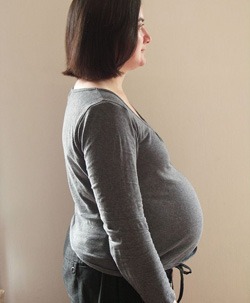 The nesting instinct may kick into high gear this week as you begin to subconsciously prepare for bringing your baby home. Many women experience a burst of energy during this time that enables them to clean or organize their homes in preparation for the big day. Don’t overdo it, though! You’ll soon need that energy both for giving birth and for taking care of your newborn around the clock.
The nesting instinct may kick into high gear this week as you begin to subconsciously prepare for bringing your baby home. Many women experience a burst of energy during this time that enables them to clean or organize their homes in preparation for the big day. Don’t overdo it, though! You’ll soon need that energy both for giving birth and for taking care of your newborn around the clock.
Also, if you don’t experience this endless energy, don’t worry! Many women find the last month of pregnancy to be exhausting and do little in terms of cleaning or organizing activities at all. If your body is telling you to rest, then, by all means, listen and put your feet up! I honestly never experienced any of the nesting instinct energy burst!
Because your body retains more fluid during pregnancy, it is normal to experience swelling to a certain degree. The swelling usually appears in the legs, ankles, feet, and fingers. Mostly, it gets worse towards the end of the day, and when you spend a lot of time on your feet. Try to rest as much as possible, especially with your feet in an elevated position.
Severe and sudden swelling might point to a more dangerous condition, called preeclampsia (link to Mayo Clinic for more information). Preeclampsia is more likely to develop in the later stages of pregnancy. Besides severe swelling, particularly in your hands and face, some of the other preeclampsia symptoms are high blood pressure, persistent and severe headaches, and changes in vision. If you notice any of these signs, inform your doctor about it.
Many women find themselves riddled with constipation and chronic backaches during this time. The increasing weight of your baby in your lower abdomen does not help, especially if you are doing things around the home or at work where you have to sit for long periods of time or are on your feet for some time. Try to stretch when you can, put your feet up to avoid swelling, and keep mobile if you sit for long periods of time to avoid stiffness.
It is also common and not unusual if you feel pelvic pain. Some of the main reasons for it at this point are the loosening of your joints in preparation for delivery, the weight of your belly and uterus, as well as the pressure of your baby’s head, which is moving deeper into your pelvis.
Pelvic exercises might help to alleviate the pain. You can also try to relax in a warm bath or lying with your hips elevated.
Your baby being positioned lower in your pelvis also means more pressure on your bladder, so the need for frequent urination is probably strong. Don’t cut down on liquid, believing it might help you avoid going to the bathroom so often. It is important to stay well hydrated throughout the pregnancy.
Vaginal discharge usually increases as pregnancy advances. However, if you feel a steady trickle or a gush of fluid, it might actually be amniotic fluid. If you think the amniotic fluid is leaking, or if the discharge seems strange in any way to you, contact your doctor. It is always better to check and stay safe.
If you find that something is leaking from your breasts, it is likely colostrum, the very nutritious breast milk created for the baby’s first couple of meals before the “real” breast milk production has started.
As the due date approaches, it would be advisable to read about what true contractions feel like. True contractions begin as irregular contractions and become regular with time. They increase in frequency, duration, and interval and don’t stop even when you rest and sleep. If you think you are experiencing true contractions, contact your doctor.
In preparation for delivery, you might also experience Braxton Hicks contractions. These are false, practice contractions. Unlike true contractions, they remain irregular and usually disappear with rest and sleep or when you change position. They also don’t increase in frequency, duration, or interval.
Things to Do and Buy This Week
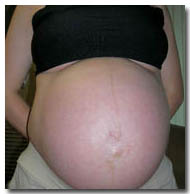 This week your doctor may perform a Group B Streptococcus Test that will help determine if you will require antibiotics during the delivery of your baby.
This week your doctor may perform a Group B Streptococcus Test that will help determine if you will require antibiotics during the delivery of your baby.
This is a simple swab taken from the vaginal area and is not painful or harmful to you or your baby. The test is not carried out automatically in all countries, and you may want to ask your midwife about it.
You may also begin to have internal exams regularly by your doctor to determine if your cervix is thinning or opening at all during the next few weeks.
I bet you have already started to prepare for D-day? If not, don’t wait. Knowing about the process and what to expect really helps, trust me… ;-) Visit our section about giving birth here.
When it comes to preparing, it might be good for you to start packing your hospital bag if you haven’t done that already. It is better to have everything ready than to be in a rush. That way, you can avoid the stress you might feel if you realize you haven’t packed your hospital bag in time.
Week 36 Pregnancy Video
Diary of a Daughter
What’s it really like being 36 weeks pregnant…? Here’s a true diary from a mom who should have been 36 weeks pregnant. (Me..!)
It is getting heavy! I find it hard to sleep – almost need to sit up. And walking is painful too. But it is slightly easier to breathe, I suppose it is because our baby is now really positioned low and ready to go.
Despite losing my mucus plug last week, I have had very few contractions this week.
Are you also 36 weeks pregnant? Please share your experiences and thoughts by leaving a comment below!
Read Next About the Third Trimester
- See what your baby is up to in these fetal development videos
- Why does labor have to hurt
- Newborn baby appearance – not as cute as in the commercials…
References
Mayo Clinic, Mayo Clinic Guide to a Healthy Pregnancy
Joanne Stone MD and Keith Eddleman MD, The Pregnancy Bible: Your Complete Guide to Pregnancy and Early Parenthood
Nilsson, L; Hamberger, L. A Child Is Born
Soderberg, L., Mammapraktika. B Wahlstroms.
Mittendorf et al (1990), The Length of Uncomplicated Human Gestation, Obstetrics & Gynecology, V.75, N.6, June 1990
Week 35 | Week 37

Paula Dennholt founded Easy Baby Life in 2006 and has been a passionate parenting and pregnancy writer since then. Her parenting approach and writing are based on studies in cognitive-behavioral models and therapy for children and her experience as a mother and stepmother. Life as a parent has convinced her of how crucial it is to put relationships before rules. She strongly believes in positive parenting and a science-based approach.
Paula cooperates with a team of pediatricians who assist in reviewing and writing articles.

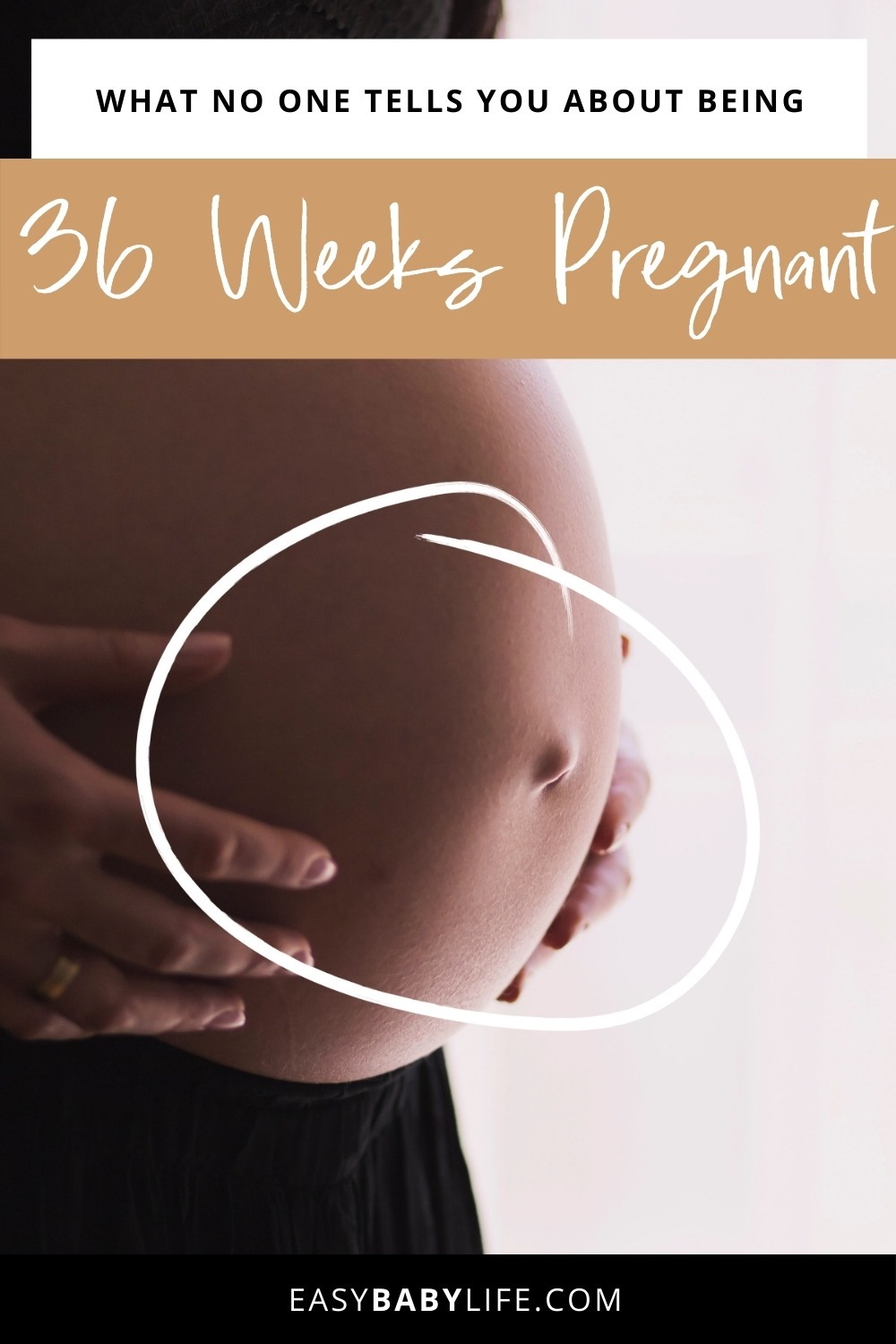






I’ve been in the early stages of labor for several days this week. It is so exciting, but I’m getting very nervous.
By mid-week, I lost my mucus plug and my bloody show has been seen more than once as a stringy light red mucus on my undies. I started wearing a pantiliner.
My contractions are getting more intense, but not yet consistent. Several times I started timing them thinking “this is it”, but an hour later they stop. Oddly, I think I contract more when I am sitting in the car than when I am laying down in bed. Doctor gave me medicine to rest and to “relax the uterus”. She said it wouldn’t stop the labor if it is time. Our bags are packed and ready to go just in case.
I feel like my body, and my baby are playing tricks on me. I feel ready even though I know it’s a little early. This is my third child, although my last child was 13 years ago. I have heard that with every pregnancy, the labor is quicker.
To be honest, everything about this pregnancy has been different. However, both my other two children were born 10-14 days early, and I feel this one will share that timeline as well. I am 37 years old and having my first boy.
I am so emotional right now. I’ll be shocked if I make it another three days before he is here. I feel like I have waited so long, and yet I am scared, excited, nervous, anxious…all rolled into one.
Hi Beth,
How very exciting! I can totally relate to feeling ready and the body playing tricks; with my daughter, my body did that for many weeks. (But with her I almost gave birth in week 26, so I am very grateful that I didn’t!)
Anyway, good luck with the childbirth and with becoming mom to a little baby again after so many years! Your older children must be so excited too!